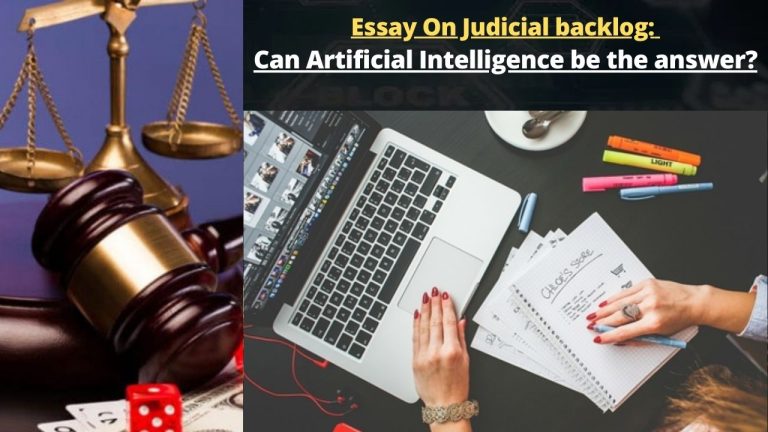"Advertisement"
Can artificial intelligence provide a solution to the judicial backlog, asks an essay?
Hello My Dear Friend, In this post “Essay On Judicial backlog: Can Artificial Intelligence be the answer?“, We will be going to read about the Can Artificial Intelligence provide a solution to the judicial backlog as an Essay in detail. So…
Let’s Start…
Essay On Judicial Backlog: Can Artificial Intelligence Be the Answer?
Introduction
For many years, judicial backlog has been a problem for legal systems all around the world.
Courts frequently struggle to handle cases in a timely manner due to the growing number of cases and insufficient resources, which causes delays and drawn-out legal proceedings.
There has been an increase in interest in using artificial intelligence (AI) to solve this issue in recent years.
The judicial process can be streamlined and automated using AI technology, which may result in a smaller backlog and greater efficiency.
This essay analyses the benefits and drawbacks of artificial intelligence as it relates to clearing the backlog in the court system.
Understanding Judicial Backlog
A court’s inability to handle the volume of outstanding cases in a timely manner results in a judicial backlog.
The backlog has a number of causes, including an increase in the number of cases submitted, a shortage of judicial resources, and complicated legal processes.
This problem not only results in lengthy delays for litigants but also erodes public confidence in the legal system.
The Potential of Artificial Intelligence
A potential approach to reducing the backlog in the justice system has emerged: artificial intelligence.
Artificial intelligence (AI) technologies can automate repetitive work, aid in legal research, and analyze enormous amounts of data, improving the accuracy and efficiency of legal processes.
Let’s look at a few crucial areas where AI can have a big impact.
1. Legal Research:
AI-powered computers can examine huge legal databases and give courts access to pertinent statutes, case law, and legal precedents.
In addition to saving time, this makes ensuring that judges have access to complete and current information so they can make informed decisions.
AI can also identify trends in court cases, which helps forecast outcomes and enhances the consistency of judicial decisions.
2. Document Analysis:
AI algorithms are capable of processing and analyzing voluminous legal documents, including pleadings, motions, and agreements.
This can aid in gathering pertinent data, highlighting important problems, and summarising case materials.
AI can greatly minimize the time required for document review by automating this labor-intensive job, freeing up legal experts to concentrate on the case’s more important parts.
3. Case management:
Systems that use AI to manage cases can speed up administrative procedures including allocating resources, monitoring deadlines, and arranging hearings.
These systems can streamline repetitive operations, lessen human error, and guarantee that cases are assigned to the most qualified judges according to their areas of specialization.
AI can help courts function more effectively and prioritize cases by improving case administration.
4. Predictive Analytics:
AI systems can examine historical case data to find patterns, trends, and other elements affecting case outcomes. This can help courts estimate whether a given case will succeed or fail, allowing them to make more educated choices.
Courts can more efficiently manage their resources, spot instances that could need alternate conflict resolution processes, and perhaps even cut down on the number of trials by using predictive analytics.
Challenges and Considerations
Although AI has promise for reducing the backlog in the justice system, there are a number of obstacles and factors that must be taken into account.
1. Ethical and Legal Implications:
Using artificial intelligence in the legal system presents ethical and legal questions. For instance, maintaining public trust requires that AI algorithms be transparent and understandable.
To secure sensitive information, data privacy, and security must also be protected.
2. Bias and Fairness:
The data that AI systems are taught determines how accurate they are. AI systems can reinforce and magnify preexisting biases in the judicial system if the training data is biased.
Making ensuring AI systems are created and taught in a way that encourages justice and minimizes discrimination is crucial.
3. Human Oversight and Decision-Making:
Although AI can support the legal system in some ways, human oversight and decision-making are still essential.
Judges should make the final determinations while considering the particulars of the case as well as moral and ethical issues. Instead of replacing human judgment, AI should be seen as an aid in it.
4. Implementation and Adoption:
Significant infrastructural, education, and technological expertise investments are necessary for the widespread use of AI in the legal system.
Implementation challenges may include integration with current systems and procedures and reluctance to change.
Conclusion
The court backlog is a major issue that legal systems all over the world must deal with.
By automating repetitive chores, streamlining procedures, and enhancing decision-making, artificial intelligence holds considerable promise for solving this problem.
However, the moral and legal ramifications, issues of fairness and bias, and the value of human oversight must all be carefully taken into account.
It is conceivable to harness their potential and build a more effective and open justice system by adopting AI technology while keeping a balanced approach.
Artificial intelligence can be a useful tool for minimizing judicial backlogs and enhancing the administration of justice with the proper application and safeguards.
Finally, Thanks For Reading “Essay On Judicial Backlog: Can Artificial Intelligence be the Answer?“.
If you have any questions related to “Essay On Judicial Backlog: Can Artificial Intelligence be the Answer?“, So, please comment below.
Must Read:
Essay On the Growing Culture of Junk Food
Essay On the Role of drone technology in Agriculture
